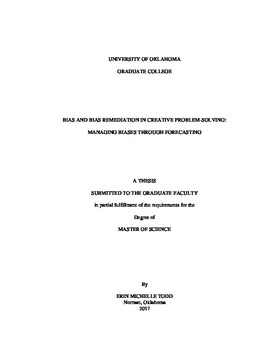Bias and bias remediation in creative problem-solving: Managing biases through forecasting
Abstract
Although scholars have identified many variables that affect creative problem-solving, less attention has been given to variables that might lead to failure in creative problem-solving. One set of variables that might lead to poor performance in creative problem-solving is decision biases. In the present study, we examined the impact of simple and complex decision biases on the production of original, high quality, and elegant solutions to a creative problem-solving task. In addition, we examined the value of forecasting instruction as a technique for reducing these decision biases. It was found that both simple and complex decision biases resulted in problem solutions of lower originality, quality, and elegance. Training in viable forecasting strategies resulted in the production of higher quality problem solutions. The implications of these findings for improving creative problem-solving performance are discussed.
Collections
- OU - Theses [2182]
